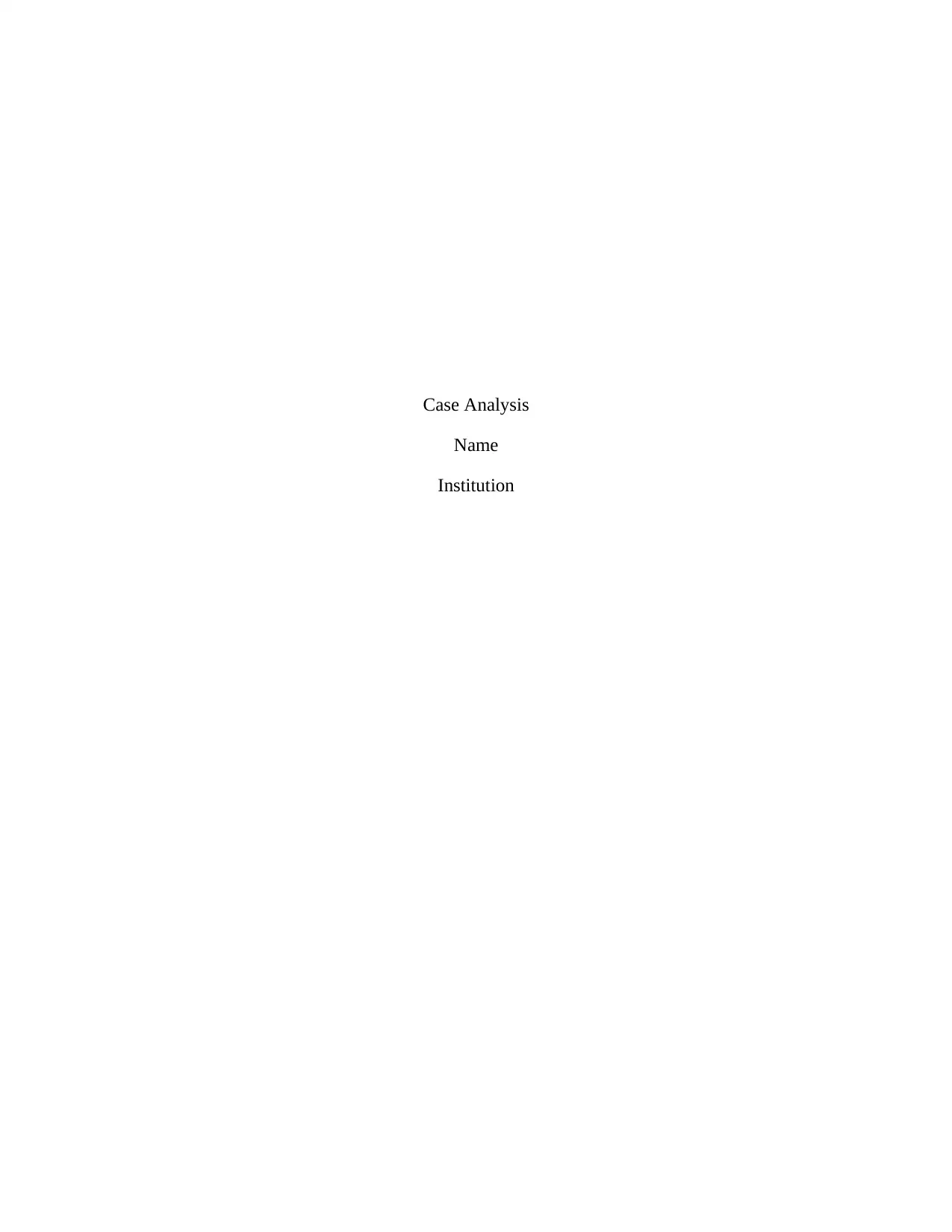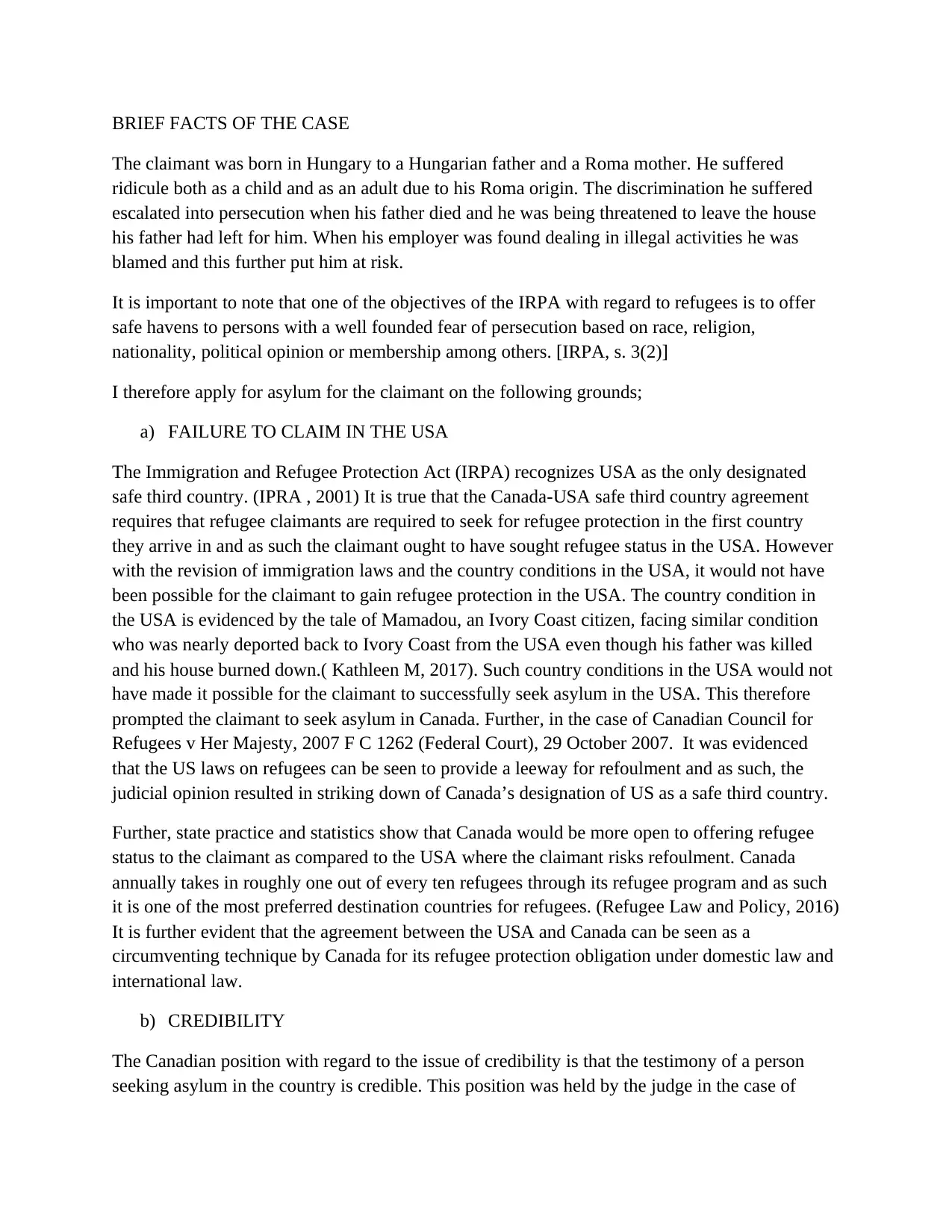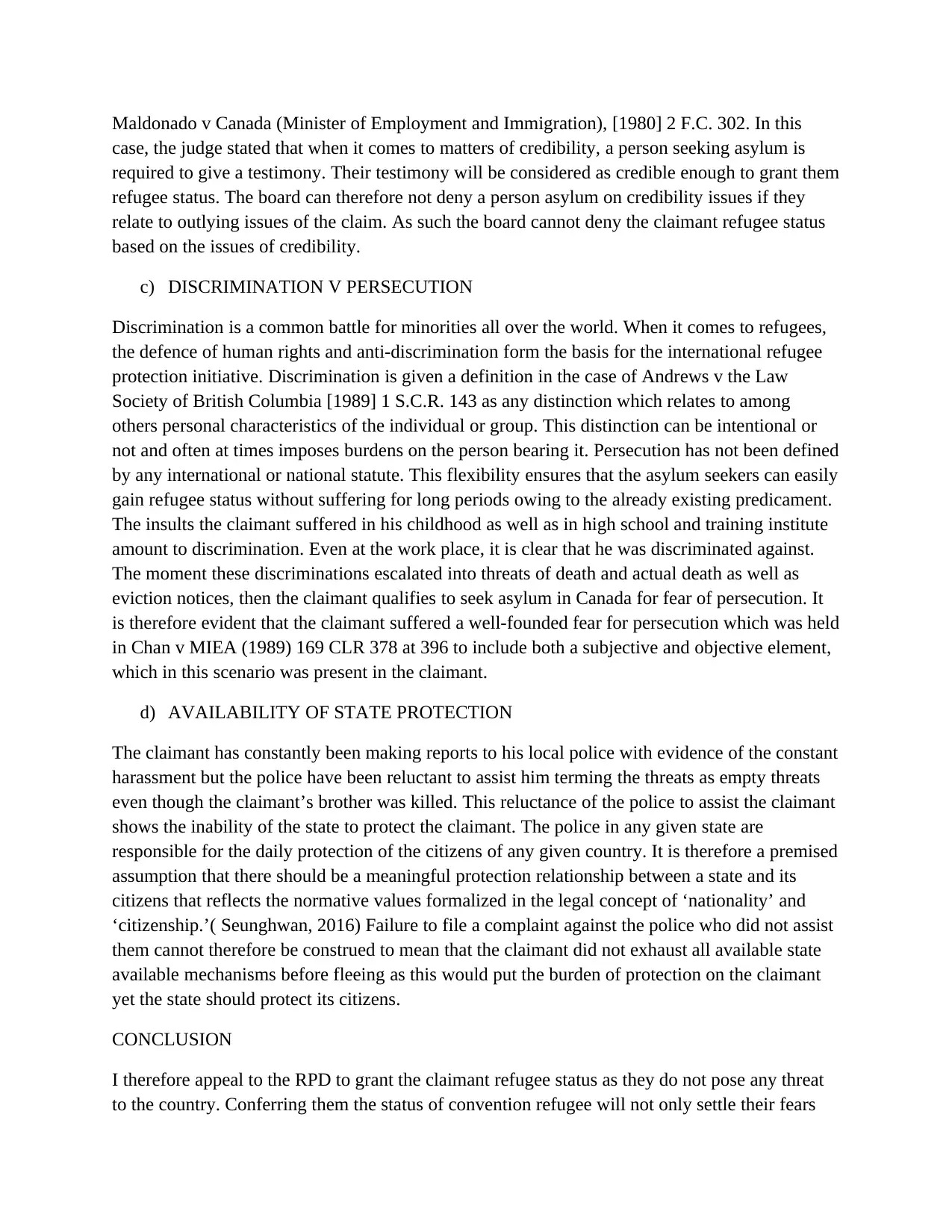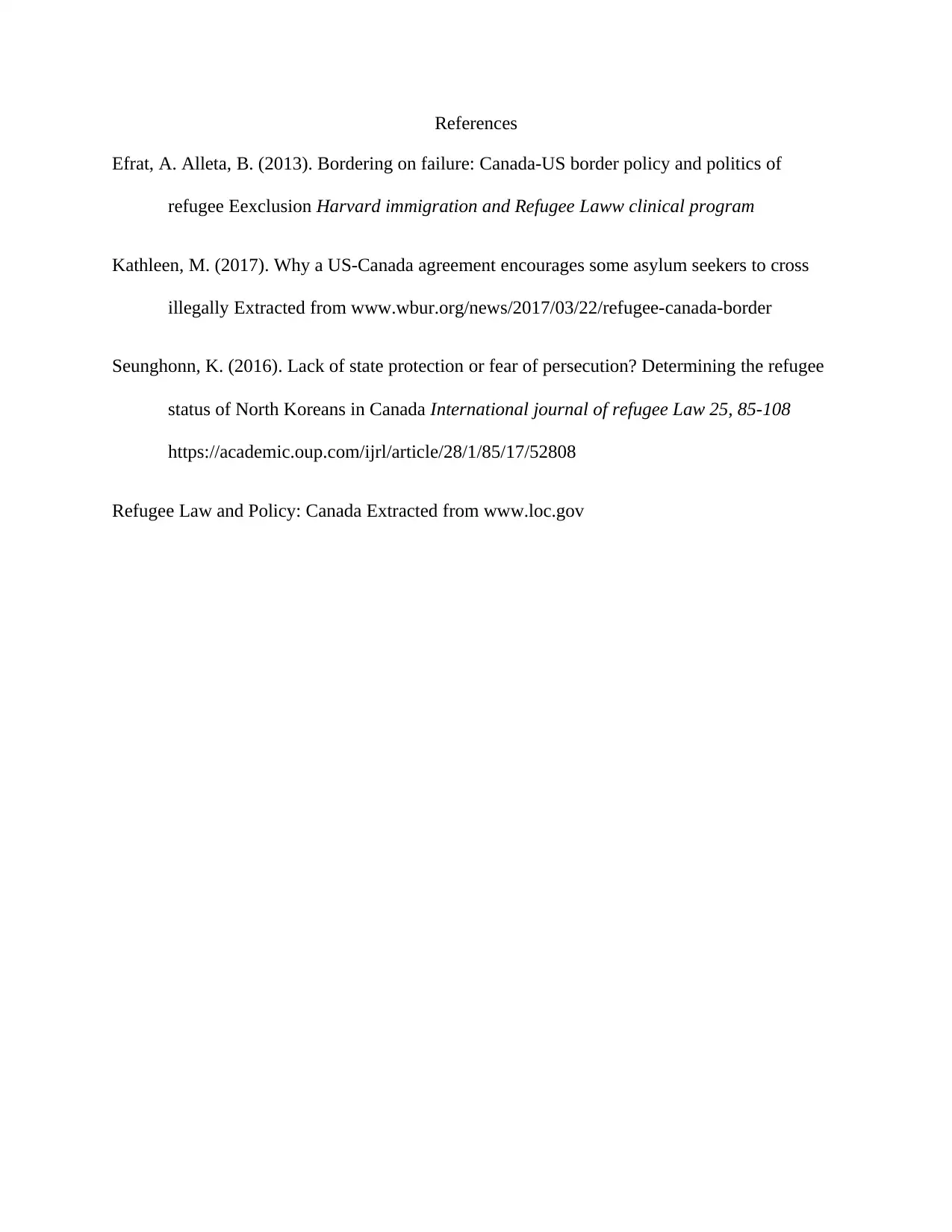Refugee Status Case Analysis: Legal Arguments and Application
VerifiedAdded on 2023/05/28
|5
|1249
|308
Case Study
AI Summary
This case analysis examines an application for refugee status by a claimant from Hungary, focusing on the grounds of persecution due to Roma origin. The analysis addresses the failure to claim asylum in the USA, exploring the implications of the Canada-USA safe third country agreement and the claimant's inability to gain protection in the USA due to country conditions and US laws. It also assesses the credibility of the claimant's testimony, referencing Canadian legal standards, and distinguishes between discrimination and persecution, arguing that the claimant's experiences escalated to persecution. The analysis further considers the availability of state protection, highlighting the police's reluctance to assist the claimant, and concludes by appealing to the RPD to grant refugee status. The document includes references to relevant legal cases and academic sources, supporting the arguments presented.

Case Analysis
Name
Institution
Name
Institution
Paraphrase This Document
Need a fresh take? Get an instant paraphrase of this document with our AI Paraphraser

BRIEF FACTS OF THE CASE
The claimant was born in Hungary to a Hungarian father and a Roma mother. He suffered
ridicule both as a child and as an adult due to his Roma origin. The discrimination he suffered
escalated into persecution when his father died and he was being threatened to leave the house
his father had left for him. When his employer was found dealing in illegal activities he was
blamed and this further put him at risk.
It is important to note that one of the objectives of the IRPA with regard to refugees is to offer
safe havens to persons with a well founded fear of persecution based on race, religion,
nationality, political opinion or membership among others. [IRPA, s. 3(2)]
I therefore apply for asylum for the claimant on the following grounds;
a) FAILURE TO CLAIM IN THE USA
The Immigration and Refugee Protection Act (IRPA) recognizes USA as the only designated
safe third country. (IPRA , 2001) It is true that the Canada-USA safe third country agreement
requires that refugee claimants are required to seek for refugee protection in the first country
they arrive in and as such the claimant ought to have sought refugee status in the USA. However
with the revision of immigration laws and the country conditions in the USA, it would not have
been possible for the claimant to gain refugee protection in the USA. The country condition in
the USA is evidenced by the tale of Mamadou, an Ivory Coast citizen, facing similar condition
who was nearly deported back to Ivory Coast from the USA even though his father was killed
and his house burned down.( Kathleen M, 2017). Such country conditions in the USA would not
have made it possible for the claimant to successfully seek asylum in the USA. This therefore
prompted the claimant to seek asylum in Canada. Further, in the case of Canadian Council for
Refugees v Her Majesty, 2007 F C 1262 (Federal Court), 29 October 2007. It was evidenced
that the US laws on refugees can be seen to provide a leeway for refoulment and as such, the
judicial opinion resulted in striking down of Canada’s designation of US as a safe third country.
Further, state practice and statistics show that Canada would be more open to offering refugee
status to the claimant as compared to the USA where the claimant risks refoulment. Canada
annually takes in roughly one out of every ten refugees through its refugee program and as such
it is one of the most preferred destination countries for refugees. (Refugee Law and Policy, 2016)
It is further evident that the agreement between the USA and Canada can be seen as a
circumventing technique by Canada for its refugee protection obligation under domestic law and
international law.
b) CREDIBILITY
The Canadian position with regard to the issue of credibility is that the testimony of a person
seeking asylum in the country is credible. This position was held by the judge in the case of
The claimant was born in Hungary to a Hungarian father and a Roma mother. He suffered
ridicule both as a child and as an adult due to his Roma origin. The discrimination he suffered
escalated into persecution when his father died and he was being threatened to leave the house
his father had left for him. When his employer was found dealing in illegal activities he was
blamed and this further put him at risk.
It is important to note that one of the objectives of the IRPA with regard to refugees is to offer
safe havens to persons with a well founded fear of persecution based on race, religion,
nationality, political opinion or membership among others. [IRPA, s. 3(2)]
I therefore apply for asylum for the claimant on the following grounds;
a) FAILURE TO CLAIM IN THE USA
The Immigration and Refugee Protection Act (IRPA) recognizes USA as the only designated
safe third country. (IPRA , 2001) It is true that the Canada-USA safe third country agreement
requires that refugee claimants are required to seek for refugee protection in the first country
they arrive in and as such the claimant ought to have sought refugee status in the USA. However
with the revision of immigration laws and the country conditions in the USA, it would not have
been possible for the claimant to gain refugee protection in the USA. The country condition in
the USA is evidenced by the tale of Mamadou, an Ivory Coast citizen, facing similar condition
who was nearly deported back to Ivory Coast from the USA even though his father was killed
and his house burned down.( Kathleen M, 2017). Such country conditions in the USA would not
have made it possible for the claimant to successfully seek asylum in the USA. This therefore
prompted the claimant to seek asylum in Canada. Further, in the case of Canadian Council for
Refugees v Her Majesty, 2007 F C 1262 (Federal Court), 29 October 2007. It was evidenced
that the US laws on refugees can be seen to provide a leeway for refoulment and as such, the
judicial opinion resulted in striking down of Canada’s designation of US as a safe third country.
Further, state practice and statistics show that Canada would be more open to offering refugee
status to the claimant as compared to the USA where the claimant risks refoulment. Canada
annually takes in roughly one out of every ten refugees through its refugee program and as such
it is one of the most preferred destination countries for refugees. (Refugee Law and Policy, 2016)
It is further evident that the agreement between the USA and Canada can be seen as a
circumventing technique by Canada for its refugee protection obligation under domestic law and
international law.
b) CREDIBILITY
The Canadian position with regard to the issue of credibility is that the testimony of a person
seeking asylum in the country is credible. This position was held by the judge in the case of

Maldonado v Canada (Minister of Employment and Immigration), [1980] 2 F.C. 302. In this
case, the judge stated that when it comes to matters of credibility, a person seeking asylum is
required to give a testimony. Their testimony will be considered as credible enough to grant them
refugee status. The board can therefore not deny a person asylum on credibility issues if they
relate to outlying issues of the claim. As such the board cannot deny the claimant refugee status
based on the issues of credibility.
c) DISCRIMINATION V PERSECUTION
Discrimination is a common battle for minorities all over the world. When it comes to refugees,
the defence of human rights and anti-discrimination form the basis for the international refugee
protection initiative. Discrimination is given a definition in the case of Andrews v the Law
Society of British Columbia [1989] 1 S.C.R. 143 as any distinction which relates to among
others personal characteristics of the individual or group. This distinction can be intentional or
not and often at times imposes burdens on the person bearing it. Persecution has not been defined
by any international or national statute. This flexibility ensures that the asylum seekers can easily
gain refugee status without suffering for long periods owing to the already existing predicament.
The insults the claimant suffered in his childhood as well as in high school and training institute
amount to discrimination. Even at the work place, it is clear that he was discriminated against.
The moment these discriminations escalated into threats of death and actual death as well as
eviction notices, then the claimant qualifies to seek asylum in Canada for fear of persecution. It
is therefore evident that the claimant suffered a well-founded fear for persecution which was held
in Chan v MIEA (1989) 169 CLR 378 at 396 to include both a subjective and objective element,
which in this scenario was present in the claimant.
d) AVAILABILITY OF STATE PROTECTION
The claimant has constantly been making reports to his local police with evidence of the constant
harassment but the police have been reluctant to assist him terming the threats as empty threats
even though the claimant’s brother was killed. This reluctance of the police to assist the claimant
shows the inability of the state to protect the claimant. The police in any given state are
responsible for the daily protection of the citizens of any given country. It is therefore a premised
assumption that there should be a meaningful protection relationship between a state and its
citizens that reflects the normative values formalized in the legal concept of ‘nationality’ and
‘citizenship.’( Seunghwan, 2016) Failure to file a complaint against the police who did not assist
them cannot therefore be construed to mean that the claimant did not exhaust all available state
available mechanisms before fleeing as this would put the burden of protection on the claimant
yet the state should protect its citizens.
CONCLUSION
I therefore appeal to the RPD to grant the claimant refugee status as they do not pose any threat
to the country. Conferring them the status of convention refugee will not only settle their fears
case, the judge stated that when it comes to matters of credibility, a person seeking asylum is
required to give a testimony. Their testimony will be considered as credible enough to grant them
refugee status. The board can therefore not deny a person asylum on credibility issues if they
relate to outlying issues of the claim. As such the board cannot deny the claimant refugee status
based on the issues of credibility.
c) DISCRIMINATION V PERSECUTION
Discrimination is a common battle for minorities all over the world. When it comes to refugees,
the defence of human rights and anti-discrimination form the basis for the international refugee
protection initiative. Discrimination is given a definition in the case of Andrews v the Law
Society of British Columbia [1989] 1 S.C.R. 143 as any distinction which relates to among
others personal characteristics of the individual or group. This distinction can be intentional or
not and often at times imposes burdens on the person bearing it. Persecution has not been defined
by any international or national statute. This flexibility ensures that the asylum seekers can easily
gain refugee status without suffering for long periods owing to the already existing predicament.
The insults the claimant suffered in his childhood as well as in high school and training institute
amount to discrimination. Even at the work place, it is clear that he was discriminated against.
The moment these discriminations escalated into threats of death and actual death as well as
eviction notices, then the claimant qualifies to seek asylum in Canada for fear of persecution. It
is therefore evident that the claimant suffered a well-founded fear for persecution which was held
in Chan v MIEA (1989) 169 CLR 378 at 396 to include both a subjective and objective element,
which in this scenario was present in the claimant.
d) AVAILABILITY OF STATE PROTECTION
The claimant has constantly been making reports to his local police with evidence of the constant
harassment but the police have been reluctant to assist him terming the threats as empty threats
even though the claimant’s brother was killed. This reluctance of the police to assist the claimant
shows the inability of the state to protect the claimant. The police in any given state are
responsible for the daily protection of the citizens of any given country. It is therefore a premised
assumption that there should be a meaningful protection relationship between a state and its
citizens that reflects the normative values formalized in the legal concept of ‘nationality’ and
‘citizenship.’( Seunghwan, 2016) Failure to file a complaint against the police who did not assist
them cannot therefore be construed to mean that the claimant did not exhaust all available state
available mechanisms before fleeing as this would put the burden of protection on the claimant
yet the state should protect its citizens.
CONCLUSION
I therefore appeal to the RPD to grant the claimant refugee status as they do not pose any threat
to the country. Conferring them the status of convention refugee will not only settle their fears
⊘ This is a preview!⊘
Do you want full access?
Subscribe today to unlock all pages.

Trusted by 1+ million students worldwide

but they will also be able to live a life without having to look over their shoulders for fear of bing
killed.
killed.
Paraphrase This Document
Need a fresh take? Get an instant paraphrase of this document with our AI Paraphraser

References
Efrat, A. Alleta, B. (2013). Bordering on failure: Canada-US border policy and politics of
refugee Eexclusion Harvard immigration and Refugee Laww clinical program
Kathleen, M. (2017). Why a US-Canada agreement encourages some asylum seekers to cross
illegally Extracted from www.wbur.org/news/2017/03/22/refugee-canada-border
Seunghonn, K. (2016). Lack of state protection or fear of persecution? Determining the refugee
status of North Koreans in Canada International journal of refugee Law 25, 85-108
https://academic.oup.com/ijrl/article/28/1/85/17/52808
Refugee Law and Policy: Canada Extracted from www.loc.gov
Efrat, A. Alleta, B. (2013). Bordering on failure: Canada-US border policy and politics of
refugee Eexclusion Harvard immigration and Refugee Laww clinical program
Kathleen, M. (2017). Why a US-Canada agreement encourages some asylum seekers to cross
illegally Extracted from www.wbur.org/news/2017/03/22/refugee-canada-border
Seunghonn, K. (2016). Lack of state protection or fear of persecution? Determining the refugee
status of North Koreans in Canada International journal of refugee Law 25, 85-108
https://academic.oup.com/ijrl/article/28/1/85/17/52808
Refugee Law and Policy: Canada Extracted from www.loc.gov
1 out of 5
Related Documents
Your All-in-One AI-Powered Toolkit for Academic Success.
+13062052269
info@desklib.com
Available 24*7 on WhatsApp / Email
![[object Object]](/_next/static/media/star-bottom.7253800d.svg)
Unlock your academic potential
Copyright © 2020–2026 A2Z Services. All Rights Reserved. Developed and managed by ZUCOL.



